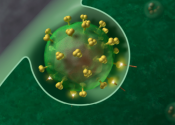New study pinpoints genetic mechanism linking dopamine to schizophrenia
Researchers at the Lieber Institute for Brain Development (LIBD) believe they have solved a riddle that has challenged scientists for more than 70 years: how the brain chemical dopamine relates to schizophrenia, the often-devastating ...
Nov 1, 2022
0
126








